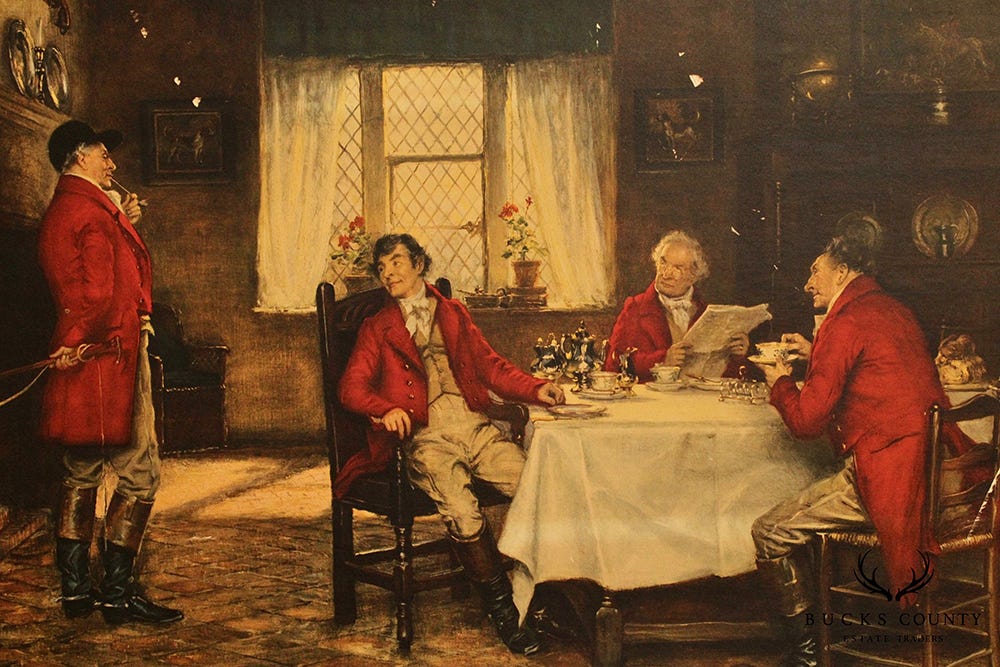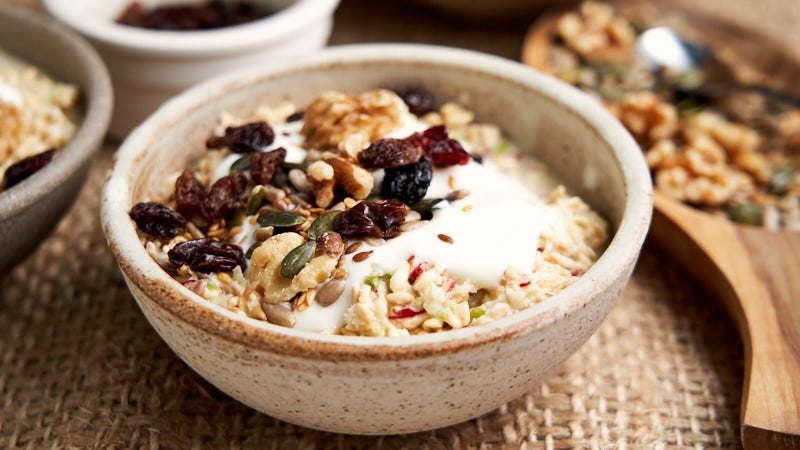Go to Work on An Egg was the slogan created by author Fay Weldon, then a copywriter, for an Egg Marketing Board campaign of the 1950s. It targetted boiled eggs, not the fried eggs of the full English breakfast, a stupefying meal.
The problem with the Full English in my book is it is served about three hours too early - unless you’re off on horseback to slaughter some wild animal.
The weighty fry-up was designed to empower not workers off at dawn to till the fields as often thought, but to envigorate the landed gentry back in the 15th century as a grand hunt breakfast. The Victorian middle and upper classes adopted the meal before the Edwardians standardised the dishes, giving us today’s English breakfast. (The Scottish breakfast includes haggis or black pudding, from Stornaway if you’re lucky, and a potato scone. The Irish breakfast might offer bubble-and-squeak which originated there, drisheen, a type of black pudding, and Irish soda bread.)
A croissant makes me sluggish, fruit seems pointless, sugared cereals only feed investors’ profit margins. The Americans have it right - brunch. It’s not served before 11 o’clock and includes spicy Bloody Marys (coffee, if you must. Coffee is one beverage Americans know diddly squat about once outside their state capitals). If you set me before fried egg, fried bread, sausage, bacon, beans, tomatoes and mushrooms, or crispy waffles and bacon with maple syrup, it’s no contest.
I’m prepared to take local breakfasts seriously in Asia. The pho that on-trend Londoners eat at night is breakfast in Vietnam. It’s a clear slow-cooked beef broth scented with spices in whose boiling heat a last-minute addition of thinly-sliced meats and optional offal cooks. Brimming with rice noodles, spritzed with lime juice, and crunching with the bean sprouts and herbs you’ve added yourself, it’s the perfect start to the day, not heavy but energising. In Burma, round which I travelled before it became clear just what violence the military regime was inflicting upon the Rohinga, mohinga is the soup to start the day, though, like pho, it’s now eaten all day long.

It’s a thick fish broth with a base of toasted ground rice and chickpea flours, flavoured with lemongrass, ginger, fish paste and sauce, and crammed, like pho, with fine rice noodles. To this nectar you add all manner of elements from crisp fried onions, chickpea fritters, fried fish cake, boiled egg, slices of Chinese doughnut, spring onions, chilli flakes, fresh lime juice, and more. So much more…
Catching the fish on Lake Inle for the soup (and other Burmese dishes) is an extraordinary balletic art.
(Before you rush to correct my use of the word Burma, courageous locals explained that ‘Myanmar’ is now used only by those who support the military regime.)
The only breakfast from that part of the world I’m less enthusiastic about is congee, Chinese rice porridge. Travelling through the night from Hanoi to Da Nang by public bus, we pulled in exhausted at 3 in the morning to a truck stop with a corrugated iron sheet roof supported on wooden posts, under which were lines of refectory tables and silent travellers. A lifelong fan of milky, vanilla-flavoured, buttery rice pudding, congee by contrast is rice boiled in so much water it breaks down into a slush you could cement wallpaper to a wall with. No amount of the tiny crispy fish, fried onions, peanuts, pork floss, egg and more piled onto it alters the flavourless base.
In the B&Bs on the 34 islands off the west coast of Scotland I’ve walked, oat porridge is the regular breakfast. I never quite became acclimatised to the fact that it’s made not with sugar but with salt, and settled happily instead for kippers and hot buttered toast.
On Uist, the owner of one B&B was a woman in her seventies with the complexion of a 20-year old. Her secret, she revealed, was to wash her face in the water in which she had soaked the breakfast oats overnight.
My own favourite way of making porridge is not to be mentioned to any Scot, please: oats simmered slowly in milk that is flavoured with vanilla extract and a teaspoon of sugar until they turn into a thick slump. Decant them into a warm bowl, pour over double cream and carry them back to a snug bed. Heaven. Perfidy.
Porridge is a good start to these days of rising in darkness and, in Britain now, the unheated bedrooms our grandparents used to describe, with window panes thick with frost into which they scratched their initials before trudging off to school. But it may be less easy to sell to yourself than Bircher Muesli, developed by Maximilian Bircher-Benner, a Swiss physician and nutritional pioneer around 1900 to treat his patients. This needs no soaking, or cooking which should make it even more appealing to Brits burdened by fuel bills.
Comforting and cuddly, it’s filled with slow-release carbohydrates that will energise you and warm you internally for so much longer than most other breakfasts without weighting you down. Plus, it doesn’t really need a recipe. These quantities for 2 servings, are completely flexible. Add more of everything or less, and double up my suggestions in order not to have to make it daily.
Coarsely grate one washed but not peeled apple into a large bowl. Add a handful (50g/4 tablespoons) porridge oats, preferably jumbo ones, 25g/2 tablespoons of whatever mix of seeds you like for crunch (sunflower, pumpkin, sesame, linseed or others), 25g/2 tablespoons of roughly chopped mixed nuts (hazelnuts, walnuts, almonds, Brazil nuts), 25g/2 tablespoons (each or in total - it’s up to you) sultanas, dried cranberries, dried blueberries, chopped dates, prunes, apricots. Add ¼ teaspoon of cinnamon if you like the flavour. Mix everything thoroughly into 100g/3½ oz of full-fat yogurt. Cover the bowl and refrigerate overnight. In the morning, spoon into bowls and top, if you like, with a chopped banana or some fresh berries.







Thank you for the breakfast round-up but you left out some of my favorites--Kerala with its lovely, lacy idliappams, Beirut with a bean-yogurt-pickle-pita combo, and Tunisia with the insanely filling lablabi, chickpea stew with multiple condiments. More to come perhaps?
Thank you. As always, an interesting article as well as humorous, perfect while eating my morning’s oatmeal. Merry Christmas.